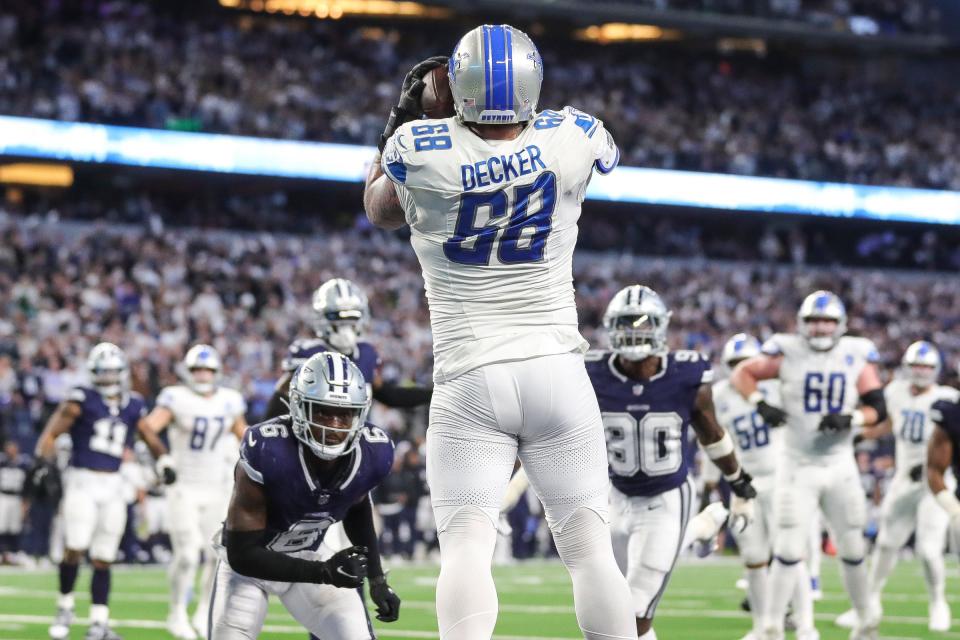The NFL owes Detroit Lions, fans, an apology after blown call | Letters to the Editor
- Oops!Something went wrong.Please try again later.
- Oops!Something went wrong.Please try again later.
- Oops!Something went wrong.Please try again later.
There are few with more job security than the Cowboys-Lions officiating crew.
After days of searing criticism over a game- and playoff-altering blown call, the National Football League doubled down with a dubiously assembled video memo placing blame squarely on the Lions.
Saturday’s game had all the makings of a career-defining win for Dan Campbell and the up-and-coming Lions. Jared Goff’s 78-second 4th-quarter touchdown drive with a running clock and no time outs led to an aggressive 2-point attempt with 23 seconds left to win and strengthen the team’s playoff seeding. The Lions set up, snapped the ball, and I waited and watched … as Goff floated a pass to #68, Taylor Decker, who comfortably waited in the end zone. That was game!
But as millions watched, the play was flagged and called back.
Just moments after the game imploded, we were stuck listening to ESPN’s broadcast crew rushing to cover for the officials on the field with various flavors of “Decker didn’t report eligible.” “There were multiple fouls on the play anyway.” “The Cowboys finally caught a break.”
Think about all the conditionals the main presumption is based on – that Decker, an eight-year veteran, wouldn’t have known he specifically would be getting the ball; that knowing this fact, he wouldn’t appropriately report to the official; and that the official wouldn’t appropriately track this reporting. But even a cursory glance at game footage vindicates Decker.
So who, pray tell, are we to expect is telling the truth?

I know that NFL apologists will dismiss these issues as “human error,” but that’s hardly what happened. “Human error” would be expecting the average person to struggle with distinguishing between numerous fouls and regulations all with game-altering consequences, not a professional, unionized group whose sole job is to study the game and make these calls.
Fanbase-specific grievances aside, what does it say about a sport if a specific subset of officials achieve universal notoriety? The head official Saturday night ‒ Brad Allen ‒ was also running the crew that missed an obvious pass interference against Kansas City Chiefs receiver Marquez Valdes-Scantling three weeks ago, and delivered an infamous no-call in a 2019 conference championship game. If anyone else blundered at their jobs three times when it mattered most, would they still be allowed to clock in? Despite this track record, the same group will oversee Saturday’s nationally televised Steelers-Ravens matchup.
It’s a common theme that has slowly been emerging across our sports leagues – the lack of accountability officials have over the calls they make, specifically when these swing the game’s outcome. This problem is more severe in the NFL, where a 17-game regular season magnifies the impact of each result.
I’m not suggesting that officials receive a public reprimand for poor performance. At minimum, fans must be assured the league has every interest in maintaining a high level of officiating quality. The NBA – ripe with its own officiating issues – has referees use PA mics to explain what was observed upon replay review, granting a modicum of access. This is in stark contrast to the NFL’s system, which only communicates whether a call stands, is confirmed or is overturned. Furthermore, the NBA’s officiating department even releases reviews of each game’s last two minutes that confirms called fouls and notes missed calls and non-calls, among other notations.
Fans expect to see their favorite players perform at their best. We should also demand the same when assessing both this scenario and NFL officiating at large.
In the past, Cowboys owner Jerry Jones has remarked that game-deciding missed calls are a “part of the game.” Surely, the same applies to showy celebrations, big hits, and even on-field equipment, all of which the NFL has forcefully regulated? It’s clear that football suffers from either a willful disinvestment in the quality of officiating, or systemic apathy for getting it right in the first place. As TV deals balloon to eye-popping numbers and gambling slowly takes over every aspect of the sport, the NFL has every incentive to right the course, particularly considering the growing (international) audience and burgeoning financial stake many viewers have.
After Saturday night, it is clearer than ever that the NFL owes the Lions, and football fans at large, an apology for the dismal quality of officiating it has allowed to thrive.
Ranganath G. Kathawate
Detroit
Submit a letter to the editor at freep.com/letters.
This article originally appeared on Detroit Free Press: NFL, apologize for ref’s bad call in Lions-Cowboys matchup | Letters

